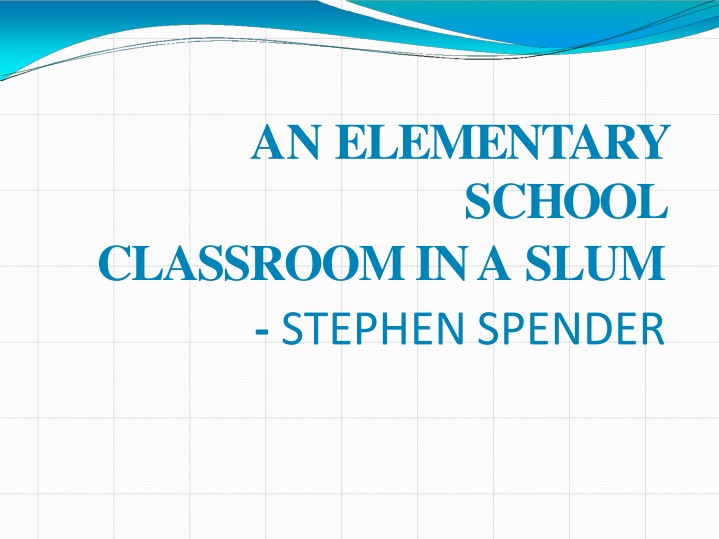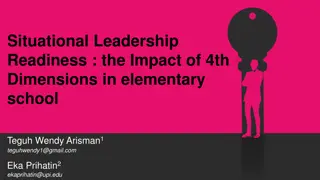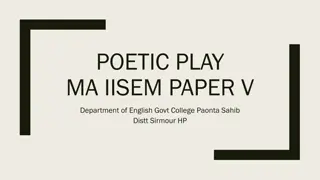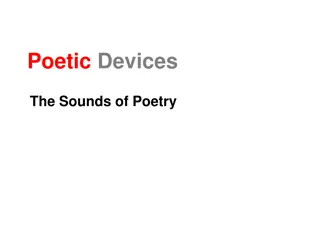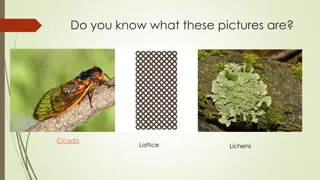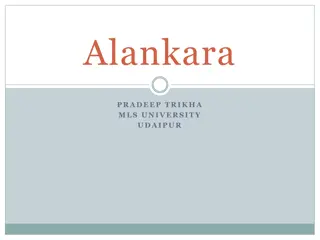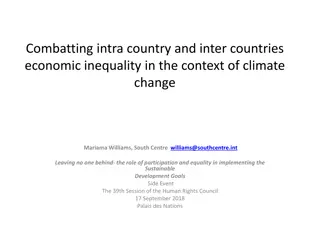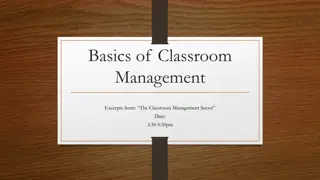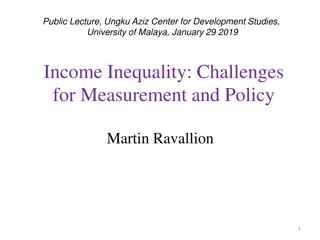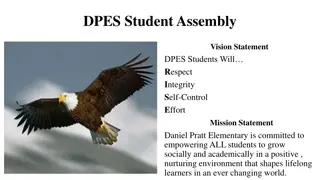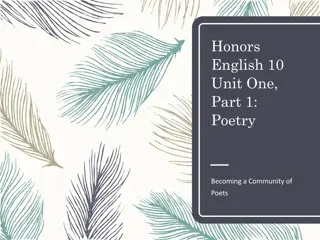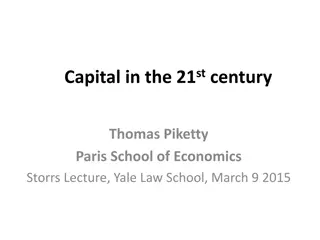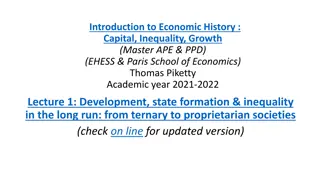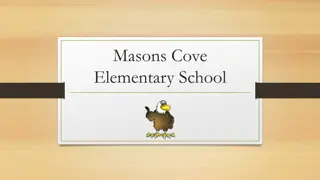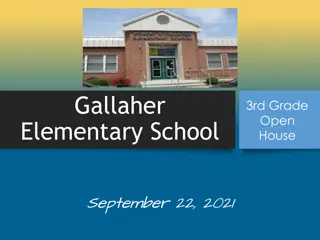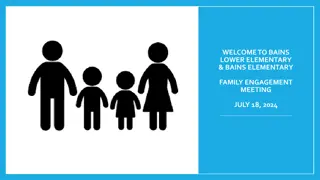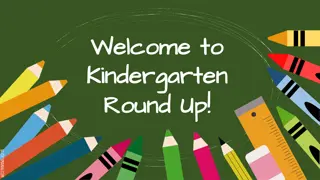A Poetic Reflection on Inequality in an Elementary School Classroom
In this poignant poem by Stephen Spender, the stark reality of social injustice and inequality is vividly portrayed through the innocent faces of children in a slum classroom. The contrasting imagery of a world untouched by poverty and despair with the grim surroundings of the classroom highlights the harsh disparities faced by marginalized communities. Spender's powerful verses invoke empathy and shine a light on the need for societal change and equal opportunities for all children, regardless of their background.
Download Presentation

Please find below an Image/Link to download the presentation.
The content on the website is provided AS IS for your information and personal use only. It may not be sold, licensed, or shared on other websites without obtaining consent from the author.If you encounter any issues during the download, it is possible that the publisher has removed the file from their server.
You are allowed to download the files provided on this website for personal or commercial use, subject to the condition that they are used lawfully. All files are the property of their respective owners.
The content on the website is provided AS IS for your information and personal use only. It may not be sold, licensed, or shared on other websites without obtaining consent from the author.
E N D
Presentation Transcript
AN ELEMENTARY SCHOOL CLASSROOM IN A SLUM - STEPHENSPENDER
STEPHEN SPENDER (1909-1995) He was an English poet and essayist who took keen interest in politics declaring himself a socialist &pacifist. BOOKS Poems of Dedication, The Creative Element World Within World. Social injustice, class inequalities, empathyfor the downtrodden are the major themes ofhis writings.
Far far from gusty waves these children's faces. Like rootless weeds, the hair torn around their pallor. The tall girl with her weighed-down head.
At back of the dim class One unnoted, sweet and young. His eyes live in a dream, Of squirrel's game, in the tree room, other than this.
On sour cream walls, donations. Shakespeare's head, Cloudless at dawn, civilized dome riding all cities.
Belled, flowery, Tyrolese valley. Open-handed map Awarding the world its world. And yet, for these children, these windows, not this map, their world,
Where all their future's painted with a fog, A narrow street sealed in with a lead sky, Far far from rivers, capes, and stars of words.
Surely, Shakespeare is wicked, and the map a bad example With ships and sun and love tempting them to steal--
On their slag heap,these children Wear skins peeped through by bones and spectacles of steel With mended glass, like bottle bits on stones. All of their time and space are foggy slum. So blot their maps with slums as big as doom.
For lives that slyly turn in their cramped holes From fog to endless night?
Unless, governor, teacher, inspector, visitor, This map becomes their window and these windows That shut upon their lives like catacombs,
Break O break open 'till they break the town And show the children green fields and make their world Run azure on gold sands, and let their tongues Run naked into books, the white and green leaves open History is theirs whose language is the sun.
Figure of Speech:Simile C yan you locate the lines which use simile in the first stanza of the poem? C y hildren s faces like rootless weeds Tyhe Paper seeming boy (Which figure ofspeech has been used in this line?)
Figure of speech: Metaphor Cyan you locate the lines which use Metaphor in the poem? Boy with rat seyes
Vacabulary weeds: unwanted plants that grow on their own Paper seeming boy: Very thin boy, as thin as a sheet of paper heir: Successor Sour: unpleasant, here refers to the colour of sour cream -off white or creamish Donations: things given or received in charity Dawn: early morning, sunrise civilized dome: here, it means rising sun at the horizon which is in the shape of a dome (semi - circle) Tyrolese valley: A beautiful ice-free valley in Austria Sealed: shut or locked lead: here, dark future of kids Capes:A large piece of land that sticks out into the sea from the coast
Wicked: evil Tempted: persuade Slyly: trickily Cramped: confined Slag: weak Mended: repaired Blot: to mark with a spot Doom: disaster Catacombs: tomb, cemetery Azure: deep blue
Explanation The poet describes the children who study in an elementary school which is setup in a slum area. The poet says that the faces of children are dull and without any energy. They are not full of energy like other kids of their age. These children are compared to unwanted weed. Here the writer wants to say that these children seem to be unwanted like the unwanted weeds which grow on their own in the fields. Their hair is not neatly done. It falls on their pale faces as if they have been torn apart. The children are untidy, they haven t combed their hair. Then he describes a tall girl who seems to be burdened by poverty. Her head is bent maybe because of tiredness or shame. There is another boy who is so weak and thin that he has been compared to a sheet of paper.
The boys eyes reflect greed and he wants to achieve everything. Then he describes another student who is physically disabled. The poet says that this boy is unlucky because he inherited a disease from his father due to which he has a deformed body. Instead of getting any facility from his father, he has received a disease in heritage. This disabled boy is sitting on his bench and is reciting his lesson. At the back of the class, in dim, dark area, was a small boy who was not visible to the poet as he was sitting in darkness. The poet could see his eyes which were bright and full of a dream. He was not paying attention to the class. It seemed as if he was rather interested in playing with squirrels in the tree house.
The poet says that the government should take notice of the problems being faced by these kids. He urges them to change the life of these kids and make the world map a reality for them. There is a need to break the restrictions which are put on them due to poverty and lack of resources. He wants the governor and public to help these kids in achieving their dreams. As this will take them away from fog to azure sky, the poet here wants to say that in this way the kids can be taken away from the darkness of their present to a bright future. He wants these kids to experience the sands and the beauty of nature as this will led to a desire of gaining knowledge. They will then go through the white and green leaves. Here white leaves depict books and green leaves depict nature. This will then result in their progress and they will be able to paint a bright future for themselves.
